Talking shop with Chris Martin
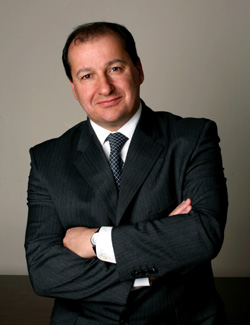
Chris Martin, CEO of Musgrave, spoke to Fionnuala Carolan about the recent Superquinn acquisition and the group's plans for a new direction
18 November 2011
When ShelfLife spoke to Chris Martin, he was just about to jet off on a family holiday. Considering the summer he has had, it’s most definitely a well-earned break. It was a long summer for a lot of people, especially the Superquinn staff and its suppliers but also for the senior management team at Musgrave, as they waited to hear the verdict of the Competition Authority. Since the approval came through on 28 September, Musgrave has become the largest player in grocery retailing in the country and the biggest employer in the FMCG market. Musgrave is now just a couple of percent behind Tesco in the multiple market with the latest figures from Kantar Worldpanel for the 12 weeks ending 30 October, showing SuperValu and Superquinn to have a combined share of 25.2% and Tesco with 27.8%. Dunnes Stores is not far behind Musgrave has 23.9% share of the market.
Musgrave has a vast network of stores across three countries which include SuperValu, Superquinn, Centra and Daybreak in Ireland; Budgens, Londis and Mace in the UK and Dialprix in Spain and the company employs 50,000 across the three territories. It’s a large operation to oversee yet Martin seems to be acutely aware of the changing dynamics, strengths and weaknesses in each one of these businesses.
Originally from Yorkshire, Martin took the position of Musgrave group CEO in April 2005, promoted from group finance director, a position he held for the previous two years. Prior to this he had been chief executive of Mothercare and group finance director of Storehouse, as well as holding various senior positions with Asda and Pizza Hut.
He is now quite happy to talk openly about plans for the group since the self-imposed embargo of the last few months has been lifted.
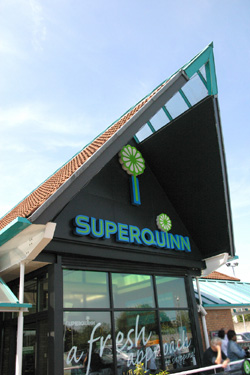 Competition Authority approval
Competition Authority approval
When the Competition Authority gave the go ahead for Musgrave to takeover the Superquinn chain of 24 supermarkets at the end of September, it was all systems go. A few days later the newly constructed management team, Musgrave Operating Partners Ireland was announced and the team swiftly moved into the Superquinn head office in Lucan. The Competition Authority had taken the best part of three months to make its decision to investigate a number of potential issues such as the consequences for suppliers and the effect the takeover would have on competition and prices in the grocery market.
Musgrave paid up €250 million to buy Superquinn, a serious bargain in some respects considering that Fergal Quinn, the original owner, was paid €450 million for the business in 2005 by Select Retail Holdings. However at that time Superquinn was not in debt to the tune of €480 million as it was by the time the company went into receivership in July of this year. Although the media has been speculating on the state of the business for the last few years it was only when the receivership came about that it became evident just how bad things had become. The combustion of the property market, reduced spending power by consumers and a board of directors that were more interested in property than grocery retailing culminated in stockpiling a shocking amount of debt over the past five years.
Musgrave spied an opportunity
Martin says that Musgrave has been considering buying Superquinn for some considerable time, at least three to four years. So why was Superquinn such an attractive acquisition for them?
“The reality of it was that we always saw Superquinn as a good addition to the Musgrave business primarily because of its fresh leadership and its presence in Dublin, because our brands were at 10% of the Dublin market and with Superquinn it will be at 22% and that is important in an Irish context.”
Martin says that they were able to react fast when the receivership happened because they had the finance in place and they had a thorough knowledge of the business and the Irish retail landscape. “We were fairly clear as to what was in there and I suppose as we went into the receivership process we had been engaged by the banks in terms of looking at the business.
“We had the finance in place too. We’ve always been prudent in terms of running our business so we had €600 million of facilities that we put in place three/four years ago but it wasn’t identified for that exactly, so from a financing point of view we were probably in a luxurious position but more importantly I think the work that we had done, the intimate knowledge of the Irish market, meant that we could move quickly. But we shouldn’t also forget that in buying from receivership we were constrained by due diligence. We had to move quickly.”
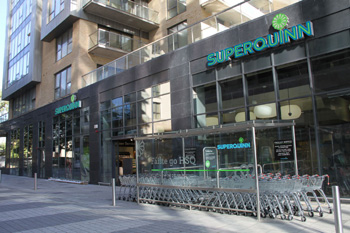 Dublin market
Dublin market
One of the reasons Martin gives for acquiring Superquinn was to increase the company’s presence in the Dublin market where it was typically weak, but surely the group could have concentrated on increasing the SuperValu brand instead? “Absolutely and we’re still driving forward with SuperValu but the Superquinn business has some great locations. Yet in saying that it is a business that has been challenged over a significant period of time. The reality is if you look at the last seven/eight years here, a business that was doing over €700 million, this year would be doing only about €490 million. You also have to take into account that during this time the whole world was turned on its head in terms of grocery retailing, the growth of Aldi and Lidl, the consumer focus on value and so on.
“The biggest thing that struck me about the Superquinn business was a lack of real in depth understanding of the consumers. Clearly there was investment put into the stores by the previous owners although towards the end, that was beginning to run out in terms of some dilapidation in the stores – the fridge doors, the two out of three light bulbs not working etc. But since we’ve gone in we’ve put a real emphasis on understanding the consumer and then working out what is the right position for the brand in terms of going forward and for us that is probably the biggest challenge.”
Supervalu versus Superquinn on fresh
SuperValu has really concentrated on its fresh element over the past number of years and stores such as Glanmire in Cork or Churchtown in Dublin are a testament to this and to the company’s commitment to making fresh food departments the hero categories of the stores. However Superquinn still has the ability to supercede all others when it comes to fresh food and Martin is not afraid to admit this.
“What Superquinn brings for us is an improved understanding of fresh leadership, which we think will be crucial across all of our brands and not just Ireland, also in Britain and Spain.”
After doing some rudimentary research on the Superquinn brand, Martin says that he thinks the shopper is attracted to “ the theatre of it, ie engaging with the butcher, the cheesemonger, the fish counter etc.
“For us there are clearly learnings there and particularly if you look at some of our other brands in Spain and in the UK, there are some real opportunities to bring these learnings there.”
Martin remarked that at the recent Budgens owners’ conference, retail analysts IGD carried out a presentation to demonstrate how shoppers choose stores and the top factor was price but very close behind was fresh leadership, product availability, store hygiene and ease of finding produce. “That’s where we come back to the fact that price is where we have to do more work but the reality of it is to differentiate yourself and remember that fresh is going to be very important.”
Superquinn head office
Once Competition Authority approval had been granted, Tim Kenny, Musgrave’s group finance and business development director was appointed as managing director of the new Superquinn operating division, Musgrave Operating Partners Ireland. One would assume that Kenny’s not just there to steady the ship but to possibly offload it of some of its cargo/dead wood. Yet it’s unlikely that any major decisions will be made in the short term as the priority is to secure the business.
Martin says: “There are skills in Superquinn that we want to get hold of in terms of running the stores but there is no doubt that we will be looking for synergies in terms of enabling Superquinn to really compete with the two big players in Dublin – Tesco and Dunnes.
“Tim Kenny has gone into the business with the management team to very much drive consumer research, improve the running of the stores but also to see how we can get the synergies to help us to drive the business forward.
“Over the recession of the last 3/4 years, we have undertaken quite a transformation programme so our businesses work together in terms of sourcing products, supply chain and so on. The difference for this division (Musgrave Operating Partners) is that it has its own stores and that’s a whole new arena for us and something we are committed to.
The most pressing issues to deal with right away are what Martin describes as “remedial spend” which is addressing those basic issues, such as getting some of the older stores up to scratch.
“At the time of the receivership we talked about a figure of €20 million to invest into the business over a period of time. That’s still earmarked but how that is being spent will depend on the outcomes over the next couple of months.”
After the housekeeping issues are in order he says then it’s time to really take the business forward, by developing the brand.
Defining the brand
Martin says that “defining the brand” and “getting under the bonnet of the business” is where they are at right now. The first step they have taken is to engage the Superquinn team with the company’s brand partners.
“We have kicked off a session with Interbrand, our brand partners, two weeks ago and that’s a process that will involve the majority of the team in Superquinn as it did with Centra and Budgens, and that’s about working through what’s currently happening in the business and where the market is going. A lot of people relate to Superquinn in terms of its halcyon days with Fergal[Quinn], who was excellent and innovative, but Feargal did leave the business five/six years ago and research points to the fact that the consumer recognised that Fergal left and that things changed.
“What is important is finding what is relevant to the brand today and going forward but also to keep a lot of uniqueness and I think that’s a challenge for the management team.”
Fixated on price
It seems that retailers are purely focusing on price these days because this is what the consumer is fixated on and Martin believes that Superquinn shoppers are no different.
“It is interesting when you look at the shopper of today. They have a certain amount of money to spend and need to manage a strict shopping list and this could be quite an interesting opportunity/challenge for Superquinn. People are saying, ‘I have €100 to spend and that’s what I’m going to spend’. Now when you think of Superquinn in the past, the shopper probably came out spending €120 because of the breath of offer and so on. We have to make Superquinn really deliver to the new ethos.”
Martin says that the consumer is very concerned about avoiding unnecessary discretionary spend. “For us when we look at the brand we wouldn’t cut the breath of fresh but maybe there are techniques to help the consumer manage their shopping list such as self-scan to keep a running track of your shopping list until you reach your trigger. Today’s shopping patterns are here to stay. It’s modest shopping from now on. Yes you will treat yourself but the rigors will be there.”
Superquinn staff
While there may be some worries regarding the safety of certain jobs, Superquinn staff are said to be very pleased that Musgrave has come in to save the business and give it a focus after such a long time hanging in limbo. Also the fact that it’s an Irish company, makes it seem all the sweeter. In fact, Superquinn staff probably haven’t felt so secure since before Quinn left the business in 2005. “The thing that really hits me is a real feeling of optimism that the company has a direction,” says Martin. “Clearly it’s been through a few changes of leadership. We had our supplier conference for Ireland a week ago and the Superquinn trading team came to that and they were very impressed by the clarity of the message and I got the feeling that they were also happy to be part of a larger group. We’ve gone into it in a mood of full engagement but also full of clarity. It’s important that the team don’t feel like things are being done to them but that they are working as part of a team to find a solution.”
Suppliers
With a large amount of Superquinn suppliers out of pocket to the tune of €100 million due to the company going into receviership, Musgrave can now put their original plan into action of releasing some capital to pay suppliers money owed to them. But how is it decided as to who gets what?
“The mechanics of this are being managed by the receiver,” says Martin. “The suppliers have to put in their claims to the receiver and he has the full knowledge of the account and he’ll be working that through where there are shortfalls but we shouldn’t forget that clearly whilst it was difficult at the start, the reality was that you had to let the process unfold so that people could work through trade insurance, get clarity on the tension of title, and as we got nearer the figure that’s where we came in with the €10 million. The figure that started was €100 million but the figure that we worked out was €60 million and that was soon worked through with trade insurance and retention of title to come down to the remaining figure that we put the fund in against.
“The other thing we did was open up suppliers to the board of Musgrave’s network and that’s been relatively successful and suppliers like Sam’s Cookies, G’s Jams, Pie Miniser and Kilowen have achieved SuperValu listings out of this so that’s encouraging.”
There are in total about 25-30 Superquinn suppliers who have now received or are in the process of finalising listings with SuperValu.
The future
Martin says that from a market perspective 2011 has been a very challenging year with flat or very small growth resulting in everyone focusing on delivering value but also a significant focus on adding space referring especially to Aldi, Lidl and Tesco.
“With Superquinn the context for us was that it enabled us to increase our presence and increase our space. We are investing €315 million in Ireland this year, reflecting the Superquinn acquisition but also quite a considerable spend still taking place with Centra and Supervalu retailers as well as the openings of Daybreak stores and that context is important because we feel that all our brands have been fairly robust.”
One thing is certain for 2012 and that is that the country’s much-loved Superquinn brand is set not only to survive but hopefully to flourish now that it is in the hands of one of Ireland’s most experienced and forward thinking retail groups.



 Print
Print


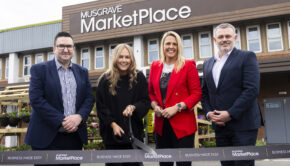
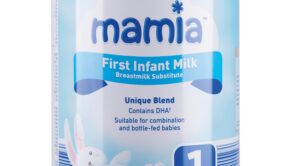


Fans 0
Followers